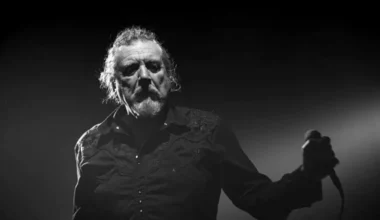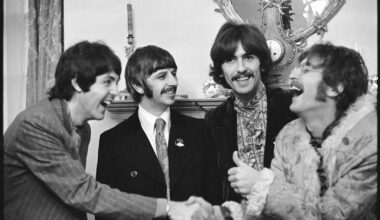By the end of the 1960s, Led Zeppelin had released their first two albums and were already a titanic presence rivalling The Rolling Stones and the moribund Beatles for the rock throne. All-time classics like ‘Good Times Bad Times’, ‘Dazed and Confused’, ‘Whole Lotta Love’ and ‘Ramble On’ had already arrived, but the best was yet to follow.
Early on, Robert Plant’s subject matter seldom skewed from a fashionable trend of sex, rock ‘n’ roll and the love of both. But as the 1970s dawned, his lyrical command blossomed to meet the burgeoning complexity of his bandmates’ compositions. Alongside rock’s progressive renaissance, Led Zeppelin and many of their contemporaries began to opt for darker themes and more aggressive instrumentals in the wake of the hippie dream.
Although poignance graced much of Led Zeppelin’s material throughout their most celebrated run in the early 1970s, the 1976 project Presence brought sombre emotion to a head. Although the album was the band’s worst received and encountered mixed reviews at the time, it has been retrospectively lauded as an inspired assortment of prog-metal tracks, if slightly limited by a lack of commercial appeal.
Although bassist and keyboardist John Paul Jones was sidelined for much of the songwriting on Presence, it was named so after the band’s strong feeling of collective presence in the studio while recording at Giorgio Moroder’s Musicland in Munich. The band had been due to take on an extensive touring regime in late 1975, but after Plant sustained serious injuries from a road accident in Greece earlier in August, this was abandoned in favour of a follow-up to Physical Graffiti.
Sadly, Plant’s wife Maureen sustained even worse injuries as the pair were evacuated back to London for emergency surgery. Plant was left wheelchair-bound for a period, and while his wife recovered, the singer was forced to leave his family to resume the band’s self-imposed tax exile.
Plant’s anguish and frustration can be heard throughout the album, but most notably in the lamenting ‘Nobody’s Fault But Mine’. “Trying to save my soul tonight,” he announces in the song before admitting, “Oh, it’s nobody’s fault but mine”. This titular line suggests that Plant could have been behind the wheel during the car crash; however, some sources claimed it had been Maureen behind the wheel.
Elsewhere in the song, Plant sings about a “monkey on my back” and says he’s “gonna change my ways tonight”. It’s unconfirmed just how much of an influence, nor how direct, the crash was on Presence, but the atmosphere was about as dark and brooding as the band would stoop.
“It was really like a cry of survival,” Plant once told Circus magazine while reflecting on Presence. “There won’t be another album like it — put it like that. It was a cry from the depths, the only thing that we could do.”
Offering his stance on the album’s tone, guitarist Jimmy Page felt it reflected a darkness less personal to the band. “I think it was just a reflection of the total anxiety and emotion at the period of time during which it was recorded,” he told Trouser Press in 1977.
“Presence is our best in terms of uninterrupted emotion,” Page later commented on the album via Led Zeppelin in Their Own Words.
Listen to ‘Nobody’s Fault But Mine’ by Led Zeppelin below.







